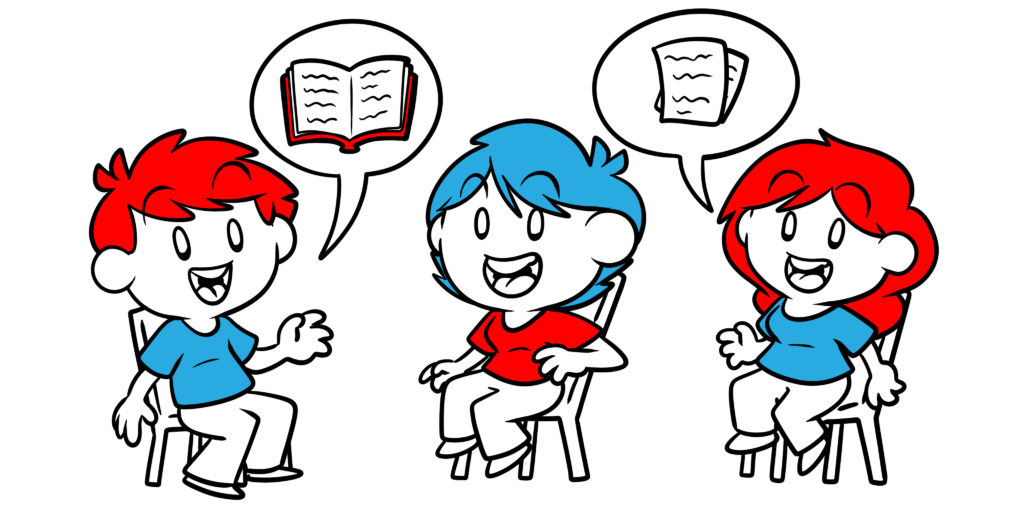Ever since the theater-sponsored workshop I belonged to disbanded in 2014, I have felt lost. I tried unsuccessfully to start groups in-person and online, created Playwrights Offering Free Feedback (#POFF), and made use of my own contacts to solicit feedback—but I missed the camaraderie of a group, as well as having a place where I could share work—or even the occasional rant—regularly. After years of attempts, I had given up when it the solution finally hit me:
Facebook.
I kick myself for not having thought of this sooner. If you’re a member of the Official Playwrights of Facebook or of the New Play Exchange, you know a lot of playwrights. And in getting to know a lot of playwrights, you probably have formed relationships off-page (if not in person) and have a sense of who’s serious about craft, whose sensibilities and work ethic align with yours, who has the commitment level to read and respond on a schedule. All you need is five of those and you’re on your way. I did this six months ago, and am now enjoying the benefits of the committed writers’ group I’ve craved for years.
Here’s how:
1) Find five or six writers whose work you respect (this is important; if you don’t respect their work, you won’t want to read it; more, you won’t respect their responses) and who have shown evidence that they read plays and are able to provide good feedback. I found mine amid the cross-section of Official Playwrights of Facebook friends and frequent NPX contributors.
2) Once you’ve got your yeses, create a Secret Facebook Group and invite them all. Make sure the group is Secret so you don’t have others finding it and asking to join, and you also know that nobody but your group will see your responses.

3) Establish a schedule of reading. We started with one play every two weeks, so that each group member would be assured a reading every three months, which gives enough time for revision if they want to submit the same play. Over time, once we’ve got our full-lengths out of the way, we may move to having two members a week share pages. There’s room to evolve.
Our schedule looks like this:
Name, Submit name of play by May 1, all respond no earlier than May 12 and no later than May 13, discussion May 14-15
Name, Submit name of play by May 15, all respond by no earlier than May 28 and no later than May 29, discussion May 30-31.
And so on. I keep a Pinned Post at the top of the thread where I continually update the schedule so each member knows when they’re up.
4) ln advance of sharing the work, I start a response thread for the play, with the name of the play and playwright, and link to its NPX page. The playwright then adds questions, one per comment, in capital letters. The playwright can ask as many questions as they want.
5) There is a two-day window for respondees to answer the questions, established so that everyone can share thoughts and have them considered. If the responses are haphazard, discussion ensues that can render later contributions less effective. In addition to answering the questions, responders add a comment with their general notes
6) Once responses have been logged, two days are left to discuss the responses. The playwright can ask follow-up questions, discuss thoughts the responses have prompted, etc.
7) The thread remains live so that if the playwright begins revisions and has a question, they can revisit the thread for review, or even to ask another question about the choices they’re making.
8) And then it begins again…

I had high hopes that this idea would flourish, and response from members has proved both its worth and effectiveness:
*”The emotional and artistic support to be found in joining an online writer’s group is invaluable. While it’s important to connect with artists in your own local theater communities, extending your social circle online can give you insight into distant regions: what kind of subject matter is being tackled there? Are there theaters there whose mission statements align with something you’ve written? Writers from different locales can aid in networking (perhaps our most important survival skill…) And maybe best of all, online groups have greater flexibility in when they can meet/interact. So far, I’ve been involved in three online groups, and each one has sharpened my work, and inspired me to try things I might have otherwise never attempted.”
*”I appreciate the format, working with longer works, that is invaluable. It’s a pleasure to engage with your pieces, and I honestly learn as much from reading plays and then doing a group-think and response on them, as I do from sharing my own. I’m grateful to have a kind of group-within-a-group to just talk to, as well, about this and that re playwriting and all its weirdness.”
*”One of the great benefits of the online group, especially with a handful of members, is the ability to read and reflect on responses other folks are giving and engage in a conversation where all are being ‘heard’ and contributing. For those of us who love to let a work ‘sink in’ before we respond, the online group removes the pressure of ‘I’d better say something now or never be heard.’ For me, that leads to reflecting more deeply before I respond and the chance to synthesize lots of comments. In ‘analog’ writing groups, I think my responses have to be somewhat more superficial just because, by the time I’ve processed, we’ve sometimes moved on to the next piece. I also love the focus on one full-length for two weeks. That’s amazing. I’m in two in-person groups, and mostly we focus on 10-20 pages of several pieces per session. It’s valuable, but really different than sustained focus.”
(I should note that over the course of the first round, one of our members became very busy with projects and requested to be paused. That playwright stays a member of the group and can read/respond at any time as a friend of the group; if, however, that playwright would like to have a play read in the future, out of fairness to the new member, that can only happen once five plays have been responded to.)
On my first round, a member generously switched with me in the schedule so I could get feedback on a play that was about to be read for an artistic director. Their response led to a solid shoring up of one character and her scenes, and the play will be produced November 2020. I felt so much more confident going into the reading knowing that I had the strongest play possible.
After years of frustration, my online group has filled a void. If you’ve got the same frustrations, give it a try! (And if you start one, ask me! I could handle another!)
(don’t forget to check out my new website by clicking on the home page!)
–Please follow me on Twitter @donnahoke or like me on Facebook at Donna Hoke, Playwright.
–Playwrights, remember to explore the Real Inspiration For Playwrights Project, a 52-post series of wonderful advice from Literary Managers and Artistic Directors on getting your plays produced. Click RIPP at the upper right.
–To read #PLONY (Playwrights Living Outside New York) interviews, click here or #PLONY in the category listing at upper right.
–To read the #365gratefulplaywright series, click here or the category listing at upper right.
–For more #AHAinTheater posts, click here or the category listing at upper right.
Thank you Donna,
We’ve never met but I have always enjoyed your insights on the BINGE and read so many of you helpful post.
I love this advice because I want to start a Writer’s Group, as I am not affiliated with any theater company now. (Im desperate to hear my new one acts!) This was so good to read.
Sincerely,
Bob Stewart
BINGER NYC
Thanks, Bob! I really am kicking myself for taking so long to come up with the most obvious solution imaginable and I was excited to share it in the hopes that others can do the same. Good luck!
Thank you so much for sharing your thoughts and process. Best of luck!